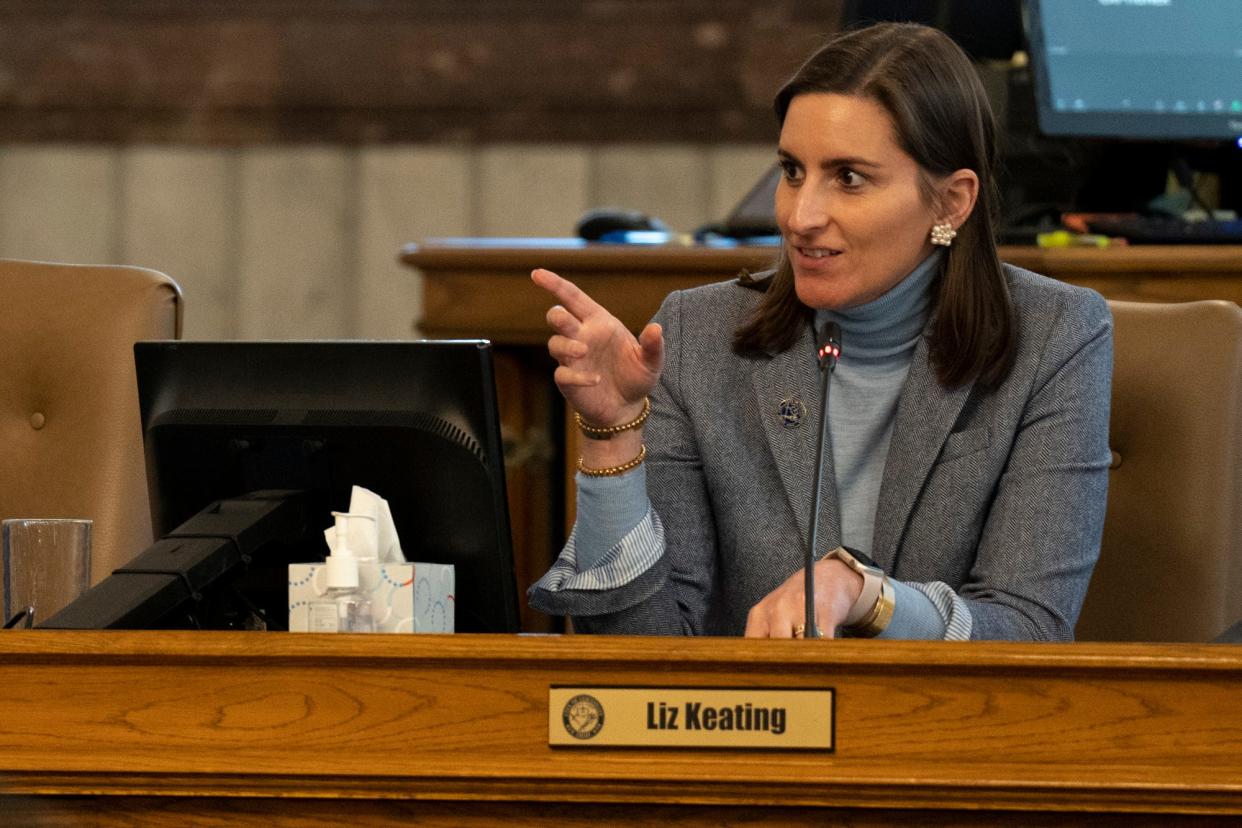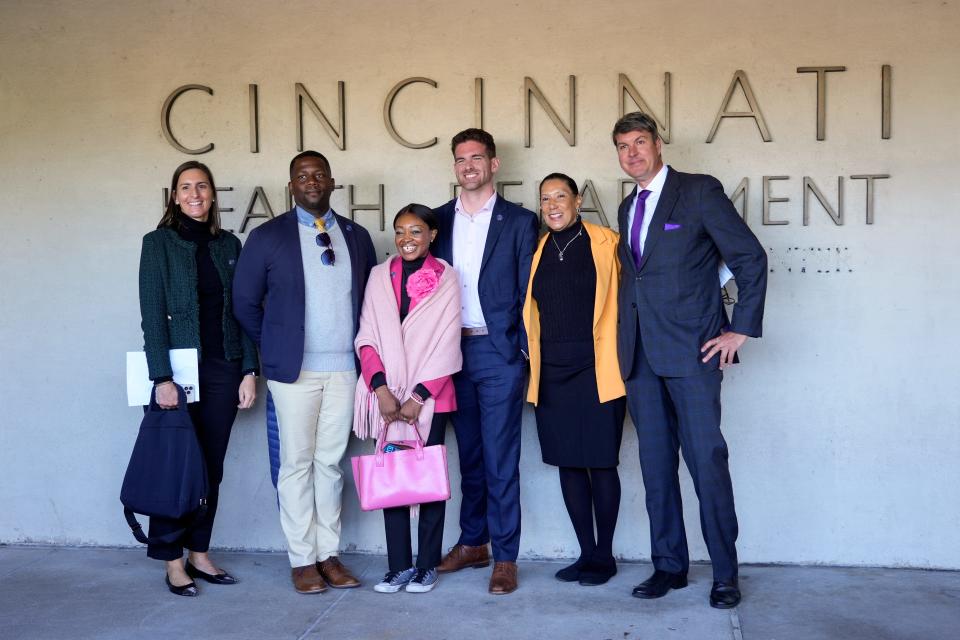Liz Keating is the last elected urban Republican in Ohio. November could bring extinction

For the last two years, Cincinnati City Councilwoman Liz Keating has been the lone Republican on the city's nine-member council, asking tough questions while remaining friendly with her Democratic colleagues.
She's part of a dying breed – a moderate Republican representing the increasingly Democratic stronghold of Cincinnati.
In fact, an Enquirer review shows Keating is the last Republican council member of any of Ohio's six largest cities: Columbus, Cleveland, Cincinnati, Toledo, Akron and Dayton.
Parma in Northeast Ohio clocks in eighth in population among Ohio's largest cities and like Cincinnati, has one Republican council member.
The question now is: Will voters keep Keating on Nov. 7 or choose one-party rule for the first time ever? Ten candidates are running for nine seats. The council is officially nonpartisan, but Keating is the only Republican. The rest are Democrats.
The Hamilton County Republican Party endorsed her but so did groups that frequently back Democrats: a trio of city unions, the Charter Committee, the Ohio Environmental Council Action Fund and Equality Cincinnati PAC, among others.
Keating is the granddaughter of William J. "Bill" Keating, a Republican congressman who later became publisher of The Enquirer. After being appointed, she won a seat on council in 2021. She placed ninth in the field of 35 candidates. Three other Republicans fell short of the needed votes.
In Cincinnati, council candidates don't have party affiliation on the ballot, but in a city of a little over 300,000 people, voters know. They're either politically savvy enough or it's hard to miss the Democrat sample ballot, which the party sends out in mailers and passes out on election day at polling locations.
Republicans in Cincinnati 'should have a voice'
Ohio Republican Party Chairman Alex Triantafilou, who was formerly the Hamilton County Republican Party Chairman, said Keating and other Republican candidates have a tough road to winning in Cincinnati because "you’ve seen a lot of Republicans leave urban centers for lower taxes, safer streets and better schools."
"Cincinnati is not all Democrats," Triantafilou said. "Republicans live in Cincinnati. They should have a voice."
"Opposition as old as Democracy," Triantafilou said. "Voters have to keep powerful people in check. And I would be remiss not to mention corruption at city hall. There has to be an alternative point of view challenging the status quo."
The election comes as the current council works to regain the trust of citizens after three council members in 2020 were arrested in separate federal corruption investigations. The most prominent, former Democrat Councilman P.G. Sittenfeld, was sentenced earlier this month to spend 16 months in prison.
When Sittenfeld was suspended from council after his arrest in November 2020, Republican Hamilton County Probate Court Judge Ralph Winkler appointed Keating to replace Sittenfeld. Winkler said at the time, "At this critical time in Cincinnati history we need a person that Cincinnatians can trust to be fair, honest and open."
Toledo and Dayton have also had elected officials arrested on federal corruption charges in recent years. All were Democrats. In Cincinnati, two of the three indicted council members were Democrats. The third was a Republican.
In September three former Toledo City Council members were sentenced for accepting bribery payments. In 2019, a federal investigation resulted in charges against a former Dayton city commissioner and three other men.
Trump, anti-city rhetoric makes it harder for Republicans
"There are a lot of things at play," said David Damore, co-author of "Blue Metros, Red States: The Shifting Urban-Rural Divide in Swing States," which assessed 27 major metropolitan areas in America, including Cincinnati. As Ohio has become reliably red, Cincinnati has become a bastion of blue.
"Moderate Republicans who could win before when they ran on good governance and being problem solvers get lumped in with (former President Donald Trump)," Damore said. "Even if they didn't vote for Trump, being a Republican is a turn-off for voters in urban areas."
What's being lost in the process, Damore said, is diversity of opinion, and that reinforces itself over time.
"You get a machine mindset and then it becomes really hard to break through," said Damore, interim executive director of the Brookings Mountain West, a Nevada-based think tank focused on the research and policy issues that affect the western part of the country.
Keating is an example of how a Republican can stay in office, said David Pepper, a former Ohio Democratic Party Chairman who was also a Cincinnati city councilman.
"She works hard to reflect the community and works across the aisle. She doesn't sound like her party." Keating, he said, "is the opposite of what I am seeing from Republicans at a higher level."
Pepper said he often sees Republicans at the state and national level deride cities and the diversity in cities.
"The tone set by the state and national party is to trash cities and be hostile toward things that make cities great and the views held by people in the city," Pepper said. "It pulls the rug out from candidates in these cities. Her path is made a lot more difficult by higher-level party rhetoric."
Keating: 'Opposition doesn't need to be combative'
Republicans know not letting that last urban seat slip away is important.

Even Republican Ohio Gov. Mike DeWine threw his might behind her candidacy when he hosted a fundraiser for Keating at Cincinnati's Queen City Club earlier this month.
"Cincinnati benefits from having a viewpoint like hers on council, and I am proud to support her campaign,” DeWine told The Enquirer.
Keating has raised $225,000 for her campaign so far from Republicans, Democrats, Charterites and independents who have hosted events.
Keating, looking around the state, said she sees politics that are increasingly more polarizing.
"Until we get back to a time when we value people over politics, we’ll continue to see blue urban areas and red rural areas without much of a mix," Keating said. "A thoughtful exchange of ideas is fundamental to democracy. Opposition doesn't need to be combative − it can be productive. It means someone is asking questions, challenging ideas, and spurring debate to encourage better outcomes. It's the role I play on Cincinnati City Council."
USA TODAY Network Ohio bureau reporter Jessie Balmert contributed to this story.
This article originally appeared on Cincinnati Enquirer: Who is Liz Keating, Cincinnati City Council candidate?

